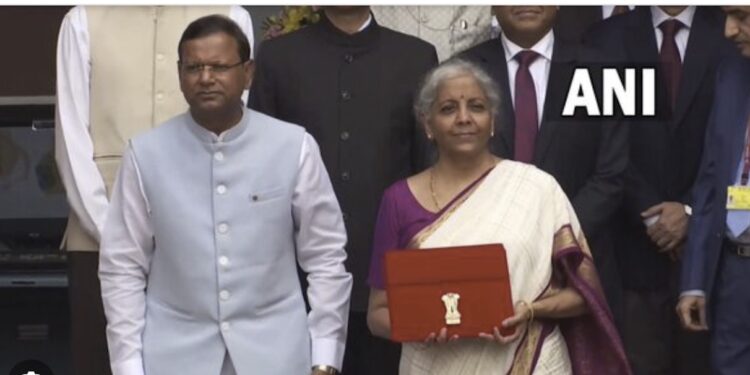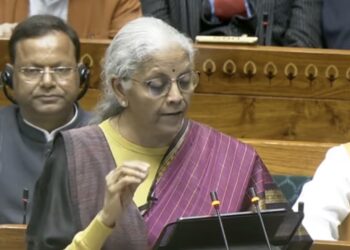Union Budget 2024: Nirmala Sitharaman, in her 7th consecutive Union Budget, introduced significant schemes and adjusted the tax system under the new tax regime, leaving the slabs in the old regime unaltered. Provided below are the reactions from business leaders across various sectors.
Debashis Chatterjee, CEO and Managing Director, LTI Mindtree
“The Union Budget 2024 – 25 is a significant step towards realizing the vision of a Viksit Bharat. The government’s comprehensive approach, encompassing skilling, infrastructure development, and digital transformation, is truly commendable. The budget’s emphasis on fostering a skilled workforce through initiatives such as the comprehensive internship program is particularly noteworthy. At LTIMindtree, we are deeply committed to nurturing talent and driving technological innovation. By equipping young talent with practical experience, these initiatives will fully empower them to contribute substantially to the nation’s progress.
Moreover, the specific focus on enhancing women’s participation in the workforce through the establishment of working women’s hostels, creches, and women-specific skilling programs is a progressive step. These initiatives will not only empower women but also contribute significantly to the country’s socio-economic development.
We view this year’s budget as a catalyst for accelerating our growth trajectory and contributing to India’s digital transformation journey. Our focus on emerging technologies and domain expertise seamlessly aligns with the government’s vision to create a knowledge-based economy”.
Uma Shankar Patro, Senior VP – Finance at InfoVision
“InfoVision applauds the government’s commitment to advancing innovation and digital transformation with the allocation of 5% of the Universal Services Obligation Fund towards telecommunications technology R&D. The renaming of this fund to Digital Bharat Nidhi highlights the critical role of a digital-first strategy in driving economic growth. We are particularly encouraged by the introduction of the Jan Vishwas Bill 2.0 and the incentives for states to adopt Business Reforms Action Plans and embrace digitalization. These initiatives are set to significantly enhance the ease of doing business and will have a profound positive impact on the IT sector, further strengthening India’s digital economy. InfoVision fully supports these progressive measures and remains dedicated to contributing to and benefiting from these transformative efforts.”
Venkatraman Narayanan, MD & CFO of Happiest Minds Technologies
“The Union Budget’s emphasis on employment, skilling, and digital infrastructure marks a transformative moment for the IT and ITES sectors. The allocation of Rs 1.48 lakh crore for these categories, coupled with the PM Package comprising five key schemes, underscores the government’s commitment to building and nurturing a skilled workforce, which is indispensable for our industry. The revised skill loan scheme and the comprehensive internship program will provide young talent with invaluable exposure and opportunities, creating a pipeline of skilled professionals.
The focus on digital public infrastructure and innovation by the private sector is a welcome move, poised to enhance productivity and create new business opportunities. The allocation of over Rs 11 lakh crore for infrastructure development, along with supporting policies to promote private investment, will significantly bolster the growth of both digital and physical infrastructure, driving holistic economic progress.
Overall, the budget’s comprehensive approach to skilling, infrastructure, and innovation lays a strong foundation for sustained growth in the IT and ITES sectors, aligning with Happiest Minds Technologies’ vision of leveraging technology for transformative outcomes. This budget is a significant step towards realizing the vision of ‘Viksit Bharat’ – a developed India – by empowering our youth, fostering innovation, and building world-class infrastructure.”
Vishal Goenka, Co-Founder of IndiaBonds.com
“The budget 2024 demonstrated financial prudence with an expected fiscal deficit target of 4.9% for FY24-25. This is constructive overall for the bond yields. The focus on infrastructure spending shall further increase the issuance of infrastructure bonds. Listed bonds continue their favorable treatment for capital gains versus unlisted bonds and debt mutual funds.”
Subramaniam Thiruppathi, Director of Sales for India and Sub-Continent, Zebra Technologies
“In the era of next-generation technologies such as AI, ML, robotics, and automation, the Union Budget 2024-25 initiatives are pivotal for preparing India’s talent pool to drive our economy towards the USD 5 trillion goal. With an allocation of ₹2 lakh crore for employment-linked skilling, incentives for creating 4 crore jobs in the manufacturing sector, and the introduction of the Model Skill Loan Scheme, our youth will have unprecedented opportunities for growth.
Providing internships and direct benefit transfers will ensure our workforce is skilled and financially supported. These comprehensive measures will build a robust, future-ready talent pool capable of spearheading India’s technological and economic advancement,” he added.
Nitin Rao, CEO, InCred Wealth
The budget build-up for long-term measures is positive. Many key areas have a positive build-up without impacting the fiscal position. Taxation increases seem negative, though they were anticipated. Markets will stabilise after the negative shocks in the short term and track the country’s progress in the medium term.
Pramod Sharda, CEO of IceWarp India and Middle East
“The Union Budget 2024 reflects a visionary approach towards strengthening India’s position as a global leader in the IT industry. The government’s continued investment in digital infrastructure, particularly through initiatives aimed at enhancing cybersecurity and fostering innovation, is commendable. These measures will undoubtedly propel the Indian IT sector to new heights, encouraging technological advancements and creating a conducive environment for startups and established enterprises alike.
Moreover, the focus on skill development and research in emerging technologies such as AI, machine learning, and Blockchain will equip our workforce with the necessary tools to compete on a global scale. The allocation of funds for expanding internet connectivity in rural and remote areas is a significant step towards bridging the digital divide, ensuring inclusive growth and opportunities for all.
At IceWarp, we are excited about the prospects this budget brings. The emphasis on creating a robust digital ecosystem aligns perfectly with our mission to deliver comprehensive, secure, and innovative communication solutions. We look forward to leveraging these opportunities to contribute to India’s digital transformation journey and drive sustained growth in the IT sector.”
Siddarth Bhamre, Head of Research at Asit C Mehta Investment Intermediates Ltd
The budget is economy-centric and especially targets grassroots issues like employment and rural economic stress. Multiple direct and indirect schemes and announcements will target the upliftment of the poor, women, youth, and farmers. The finance minister has made this budget to enhance employment, increase skill sets, ease business for MSMEs, and provide tax measures for the middle class. From the capital markets point of view, it would be slightly disappointing as far as taxation is concerned. The economic measures announced are the need of the hour for rural employment and reduce stress in the MSME space. This budget has targeted the pain points in the economy.
Dhawal Dalal, President & CIO-Fixed Income, Edelweiss MF
“The final Union Budget for FY25 continued the ongoing theme of continuity while increasing focus on employment, ease of doing business, tourism, and rural infrastructure. While total capital expenditure for FY25 was kept unchanged at Rs. 11.1 trillion, the fiscal deficit for FY25 was reduced to 4.9% from an earlier estimate of 5.1%. From the bond market’s perspective, gross borrowing & net borrowing through dated IGB in FY25 is marginally reduced by ~Rs. 12,000 crore to Rs. 14.01T and Rs. 11.63T, respectively. It is marginally lower than market expectations. Further, taxation on fixed deposits, debt mutual funds, bonds, and Market-linked bonds were kept unchanged. This was a bit of a damper for fixed-income investors. That said, we don’t expect a significant change in investor sentiment. Overall, it is a pragmatic Union Budget from the financial market’s perspective.”
Disclaimer: Mr. Dhawal Dalal is President & Chief Investment Officer – Fixed Income of Edelweiss Asset Management Limited (EAML), and the views expressed above are his own.
Kannav Thukral, Managing Director, BlackZone Mobiles
Finance Minister Nirmala Sitharaman’s budget is a game changer for the mobile industry and the MSME segment under the ‘Made in India’ initiative. The reduction of Basic Customs Duty (BCD) on mobile phones and chargers to 15% is a significant step that will lower production costs, making Indian-made mobile devices more competitive. This move will enable the industry to reach a broader audience, and the reduced taxes will lead to higher profits and increased production.
The enhanced credit guarantee scheme and the facilitation of term loans for machinery purchases are also set to invigorate the manufacturing sector. The tailored package for technology support and the new bank credit mechanism will significantly enhance digital capabilities and financial stability for new businesses and investments. By unlocking working capital and expanding the Mudra loan to 20 lakh, the government is empowering manufacturers to scale up operations without the burden of collateral. These measures will not only drive growth but also reinforce India’s position as a global manufacturing hub for mobile devices.”
Anil Joshi, Managing Partner, Unicorn India Ventures
The 1000 Cr fund of funds for space tech is a testimonial to India’s capability to come up with breakthrough solutions at low cost. This will certainly help space tech companies to look for much-needed early-stage capital to get started. This will certainly help mobilise over Rs 4000 Cr, great move. Angel Tax abolishment was long pending, glad that Hon. FM has heard industry voices and has finally abolished it. This will certainly help in the expansion of angel investment in India and will take away a lot of burden from the minds of everyone on tax notice for tax-paid investment. This will also free up a lot of domestic capital and improve the funding sentiment in a strong way.
Ujjwal Minocha, Co-Founder and COO of Velmenni
Budget 2024 brings in a significant boost for ‘Make in India’ in the defense sector to uplift domestic markets, which is a positive sign. This initiative is expected to bring fundamental changes in the next 3-4 years by generating employment and placing India on the global map as a center for defense sector exports.
Ashish Singhal, Co-founder, Lemonn and CoinSwitch
“We welcome the Union Budget 2024-25 as a pro-development budget bringing great news for startups. As a founder and angel investor, I’m thrilled that the Angel Tax has been abolished. This will significantly bolster the entrepreneurial ecosystem in India.
The emphasis on digital public infrastructure and the digitalization of the economy will greatly benefit tech startups like ours, which are focused on developing population-scale apps for Indians.
However, the securities markets face challenges with the increase in short-term capital gains tax from 15% to 20%, the rise in long-term capital gains tax from 10% to 12.5%, and the hike in STT on F&O. The immediate market reaction has been less than positive.
Regarding crypto, we had hoped the government would reduce taxation to align it with other asset classes. Unfortunately, this has not been addressed, representing a missed opportunity to support startups and investors in the crypto space.
We are still examining the finer details of the budget to fully understand its broader implications.”
Roland Landers, CEO, All India Gaming Federation
The All India Gaming Federation (AIGF) welcomes the focus on skilling in the 2024 Budget. There remains a significant skill gap in India’s gaming industry, and the increased emphasis on skilling initiatives is a promising step towards bridging this gap. Centrally sponsored schemes for skilling youth, women-focused programs, the establishment of industrial training institutions, and the provision of internships are all set to create a more skilled workforce.
Miniya Chatterji, Founding Director, Anant School for Climate Action, and CEO, Sustain Labs Paris
“The government has focused on energy security as one of the pillars in the Union Budget 2024. The new policy document on India’s energy future is much awaited, and I expect it to include the plans to achieve rooftop solarisation, enhance electric vehicle infrastructure, and promote biodegradable polymers & bioplastics – as was announced in the interim budget in February.
I also look forward to the government’s focus on developing indigenous energy technologies and building local capabilities amongst micro and small industries in energy production and management. On that note, the provision of financial support to micro and small industries for shifting to cleaner forms of energy is also a commendable move by the government.
Another good move is the exemption of custom duty on capital goods for manufacturing of solar cells and panels. A taxonomy for climate finance, as planned by the government, will help improve the availability of funds for adapting to climate change and reduce greenhouse gas emissions.
Under urban development, the budget also talks about promoting water supply, sewage treatment and solid waste management projects and services for 100 large cities in India. This will set a benchmark for water and waste management practices which can then expand to tier-2 and tier-3 cities eventually.”
Govind Rammurthy, CEO and Managing Director of eScan
The Union Budget 2024-25 reflects the Government’s strong commitment to fostering economic growth, with a clear focus on infrastructure development, boosting consumption, and promoting domestic manufacturing. Key initiatives include significant capital expenditure increases, incentives for skilling and employment, and enhanced support for MSMEs. The budget also emphasizes women’s empowerment, with new schemes for housing and entrepreneurship, and aims to drive technological advancements through R&D incentives for emerging technologies like AI and the Internet of Things (IoT).
These measures, along with efforts to promote ‘Made-in-India’ (MII) technologies in both the private sector and PSUs, are expected to significantly bolster the country’s economic trajectory and technological prowess, especially in the critical areas of Cybersecurity and Artificial Intelligence.
Also Read: Do Our Abilities Match the Ambitions of Smart Cities?























